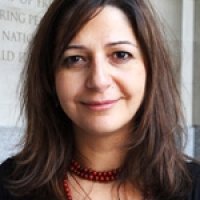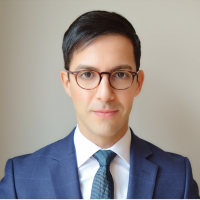The Impact of Iran’s Presidential Election on Domestic Issues and Foreign Policy
Panel 1: Presidential Elections, Domestic Politics, and Future Challenges
Four experts discussed the domestic challenges Iranian President Hassan Rouhani faces after his reelection on May 19, 2017.
On May 24, 2017, the Middle East Program at the Woodrow Wilson Center hosted the event “The Impact of Iran’s Presidential Election on Domestic Issues and Foreign Policy.” The first panel featured Ellie Geranmayeh, Senior Policy Fellow (MENA) at the European Council on Foreign Relations; Alireza Nader, International Policy Analyst at the RAND Corporation; Ali Vaez, Senior Iran Analyst at the International Crisis Group; and Alex Vatanka, Senior Fellow at the Middle East Institute. Haleh Esfandiari, former Director of the Middle East Program at the Wilson Center, moderated this panel.
Nader described President Rouhani as a pragmatist who maintains both key links to and political distance from reformists. He identified a more aggressive agenda as critical to Rouhani’s future political success, listing these necessary reasons: the economy is still underperforming, despite the JCPOA; unemployment is rising; and Iran is isolated from the global financial system. Nader concluded that the window for dialogue with the United States may soon pass due to abrasive rhetoric from the Trump administration.
Geranmayeh noted the economy became the election’s central focus because Iran’s leadership realized the population was craving an improved economy and better foreign relations. She also discussed economic issues related to the rising unemployment rate, growing social and income inequality, and systemic corruption, and detailed the importance of reconnecting the banking and financial infrastructure, addressing remaining U.S. sanctions, and ensuring that revenues from oil exports positively affect job growth. Rouhani’s election, Geranmayeh claimed, signifies a shared vision between the electorate and leadership over a path of reform.
Vaez said he hopes the JCPOA will remain in place. Despite differences over the approach to negotiating tactics and the deal not fully delivering on expectations, he stated that all candidates pledged commitment to the deal. While Iranian leaders indicate that Iran will not be the first to violate the JCPOA, they do believe it will be “killed not by a gunshot but rather by a thousand cuts.” If this happens, Vaez said Iran will have to convince international actors that it is not culpable. Vaez concluded that Iran faces challenges in reaping the rewards of the JCPOA without further sanctions relief, especially considering the low appetite for the concessions required.
Vatanka stated that the election results showed the electorate’s hostility toward the Islamic Revolutionary Guards Corps (IRGC). The electorate saw Ebrahim Raisi as propped up by the IRGC, according to Vatanka, and his resounding defeat signified opposition to a more powerful IRGC. Conversely, Vatanka indicated that Rouhani targeted the IRGC to illustrate himself as a reformist to gain votes. He concluded by noting that reformists moving forward need to openly question the IRGC’s actions to enact the change they desire.
Esfandiari asked the panel about the relationship between the Supreme Leader and the IRGC. Geranmayeh said the Supreme Leader understands that opinions are changing, but he also must understand the IRGC’s vast deep-state culture; a reformation of the IRGC is a decades-long project. Nader discussed the Supreme Leader’s support for both Rouhani and the IRGC; the Supreme Leader is not completely supportive of Rouhani’s directives, but he also understands that if the IRGC dominates succession, conflict will persist. Vatanka indicated the electorate desires not a systemic shock but rather a gradual approach to reform the IRGC.
In response to a question about how minorities voted, Vaez said roughly 70 percent of Iranian Kurds voted for Rouhani; Vatanka also noted that reformists perform best amongst minorities. Answering additional questions from the audience, Nader said he expects closer cooperation between Russia and Iran in Syria, Iraq, and Yemen. Geranmayeh stated that European actors are delicately discussing human rights in Iran, because there are beliefs that progress can occur under the radar.
By Jack Durkee, Middle East Program
Panel 2: Supreme Leaders and Presidents: Election Outcomes and Foreign Policymaking
Four experts discussed the potential impact on foreign policy after the Iranian presidential election on May 19, 2017.
On May 24, 2017 the Middle East Program at the Wilson Center hosted a two-panel event “The Impact of Iran’s Presidential Election on Domestic Issues and Foreign Policy.” The second panel featured Robin Wright, USIP-Wilson Center Distinguished Fellow; Bernard Haykel, Professor of Near Eastern Studies and Director of the Institute for Transregional Study of Contemporary Middle East at Princeton University; Hanin Ghaddar, Inaugural Friedmann Visiting Fellow at The Washington Institute; and Mohsen Milani, Executive Director of the Center for Strategic & Diplomatic Studies and Professor of Politics at the University of South Florida. Henri J. Barkey, Director of the Middle East Program at the Wilson Center, moderated this panel.
Wright began discussing U.S.-Iran relations by underscoring how there is no foreign policy issue on which President Obama and President Trump differ more than Iran. While the United States and Saudi Arabia indicate they are committed to the JCPOA, both also believe Iran poses a threat and want the nuclear agreement reevaluated. Wright highlighted the “enemy of Iran is my friend” mentality taken by the U.S. administration, exemplified by President Trump working toward publicly uniting Saudi Arabia and Israel against the Iranian government. However, Rouhani has said that he will continue with Iran’s missile program, a decision which Wright believes will lead to more tension and additional sanctions. She noted the United States and Iran both desire the eradication of ISIS and asked whether there could be a mechanism to bring de facto cooperation between the countries, but she also said this was less likely under the current U.S. administration. With the EU beginning to engage with Iran, Wright reasons it will be difficult for the United States to maintain an isolationist position toward Iran when its allies are working so closely with the Iranian government and economy.
Haykel started his discussion on Saudi-Iran relations by acknowledging that Saudi Arabia and the United States are relatively uniform in that they “do not believe anything that comes out of Iran.” Haykel noted that Saudi Arabia is looking for opportunities to engage with minorities in Iran (Sunnis, Arabs, and Balochi) to undermine the regime. He gave several examples of Saudi Arabia feeling constricted by Iranian politics: the success of the IRGC model, the support for Hezbollah, and the training of the Houthis in Yemen. Regarding Yemen, Haykel believes it could be the best avenue for lessening tensions between Iran and Saudi Arabia; he said that with assistance from the United States, Iran could withdraw Hezbollah and engage in dialogue. Haykel concluded by stating there will be a period of high tension in the Gulf states, and in the future Saudi Arabia will work toward standing up to Iran on contentious issues without U.S. assistance.
Ghaddar began by reviewing the phases of Hezbollah. The first phase started in the 1980s as highly ideological and focused on resistance; during the second phase, the group was more integrated into Lebanese state institutions and gained popularity; and in the third phase, characterized by military leader Qasem Soleimani, Hezbollah gained regional presence and military capacity. Ghaddar pointed out that Hezbollah was able to militarize the community by isolating the poor and monetizing fighting in Syria. She highlighted the state of Hezbollah today, saying that it has adopted a corporate structure through providing jobs and monetary support to communities. She said today’s fighters are more sectarian, less trained, and more aggressive. Ghaddar also addressed whether President Rouhani will change anything related to Hezbollah, noting there has yet to be any change under his rule; she said Hezbollah is under the Quds Force, a unit of the Revolutionary Guards, which Rouhani does not control.
Milani stated that Iran is becoming more pragmatic and listed four facets of Iran’s regional policy: the desire to create a sphere of influence, the pursuit of retaliatory capability, the use of language politics, and the effect of U.S. policy. Milani then presented three regional goals of Iran: the continued support for Hezbollah and the construction of a land corridor through Iran, Iraq, and Syria; the prevention of Iraq becoming a national security threat; and the destruction of ISIS. He noted that Iran has done more to defeat ISIS than other countries in the region, but that the country cannot do it alone. Looking to the future, Milani mentioned this could be an area of possible cooperation between Iran and the United States.
By Dorothy Rau, Middle East Program
Speakers

Inaugural Friedmann Visiting Fellow, Washington Institute for Near East Policy


Moderators

Senior Fellow, Council on Foreign Relations

Hosted By

Middle East Program
The Wilson Center’s Middle East Program serves as a crucial resource for the policymaking community and beyond, providing analyses and research that helps inform US foreign policymaking, stimulates public debate, and expands knowledge about issues in the wider Middle East and North Africa (MENA) region. Read more
